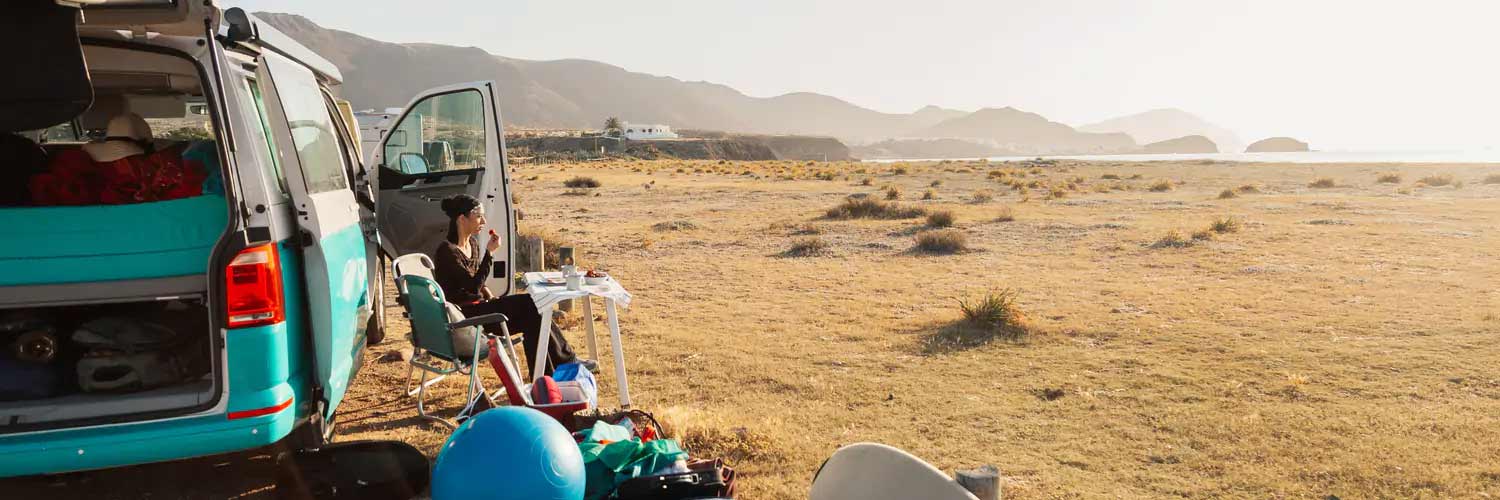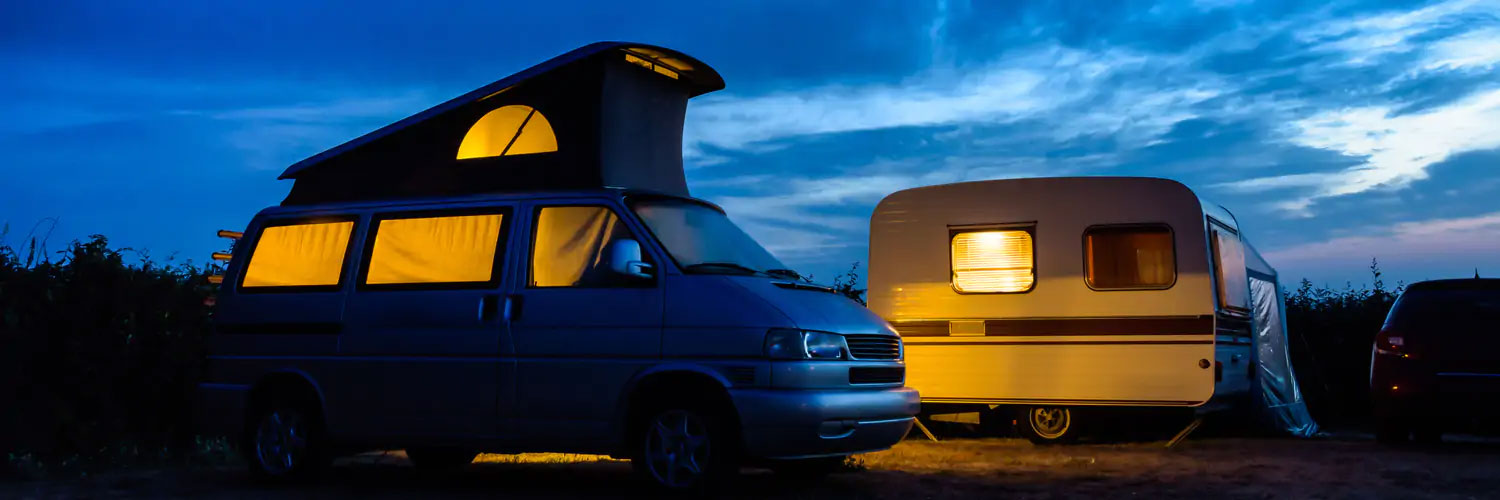This guide explores the pros and cons of campervan ownership to help you decide if it’s the right fit for you.
Campervans; they’re a vehicle for unlocking travel, adventure and freedom, both literally and figuratively. Whether you’re a VW classic lover, a DIY’er looking for your next project, or a camper looking for a different way to explore, campervans are the answer.
The question of owning a campervan will have most people – and their families – split indecisively between whether now is the best time to buy a campervan, of if they should hold off for a few more years.
Existing campervan owners will love to tell you tales of nights spent across the country, or even the world, under the stars, sitting in their campervan with a firepit going outside and the cosiness of a hot beverage in their hands.
Campervan ownership isn’t all roses, there are some thorns every now and then. However, being a campervan owner unlocks a new way to explore the world, as well as a different way of life.
So, in this blog, we unpack the answer to the question: “Should you actually buy a campervan?”
The Perks of Owning a Campervan
1. The ease of going on holiday
Campervan ownership has its perks. One of the most enjoyable benefits will always be the ease of getting away and going on holiday without the need to plan, pack or book expensive hotels for the night.
Going away in a campervan simply requires either getting a pitch on a campsite, or using BritStops if your campervan is self-sufficient, or if you’re in Scotland, ready for wild camping! Most campsites, especially in low and mid-season (September until end of March), will often take bookings up until the night before, and some even allow for drive ups on the day.
Across the UK, there’s over 1,000 BritStops and nearly 8,000 campsites, so you’ll no doubt have one near you, or within a short drive.
2. Getting outdoors
For those who want to surf, mountain climb, mountain bike or generally get more outdoors, a campervan can really unlock these opportunities. You don’t have to use a campervan to purely camp with, but you can use it as a base for your adventures, whether that’s for the day or for a longer weekend.
Campervans have a lot more room than cars, and because you can adapt them to your needs, often with some minimal DIY, they can become a way for you to make adventures more feasible. Campers, unlike cars, are more practically built for adventuring.
Think about surfing for a day, and then mid-surf, heading back to your campervan for some hot lunch and a nice cup of tea, before heading back out to catch some more waves. Or going hiking and being able to have a hot shower and clean all the mud off, before driving back home and relaxing.

3. Taking your pets with you
While some campsites don’t allow certain breeds of dog or animals at all, most will allow pets in all shapes and sizes.
Whether you’ve got a dog or a cat, a campervan allows you to take your pet with you without needing to find a way to keep them warm at night in a tent, which doesn’t always have the right space.
Check before you travel, ensuring that your destination or campsite allows pets, and whether there’s an additional fee per pet (we’ve never seen it higher than about £5 a night, but this will depend on where you stay).
4. Holidays become more affordable
Depending on where you go (and which season you travel in), you’ll often find that per night, campervanning is much more affordable than hotels, Airbnb’s or other accommodation.
Campsites often price based on:
- Pitch (where you park) size
- Whether the pitch is hardstanding (not grass based, often gravel or tarmac) or grass based
- Whether you want hook-up (electricity) or not
- The number of people coming with you, specifically how many adults and children you’re travelling with. The more people you have, the more expensive camping becomes, as pitches often have a maximum number of people.
- Any animals you’ll be bringing
- Whether you’ve got an awning, gazebo or pup tent (a tent used solely for sleeping in, often smaller than 1.5x2m)
- The time of year (Low season is November to February, mid-season is March to May and September to October, while high season is May to August)
- If you want to bring an additional car with you
The more of the list above you choose to add on, and the more people you bring with you, the more expensive it will be. And, if you go over a summer bank holiday weekend, or during school holidays, expect it to be more expensive and very busy.
Even with all these additional factors, four nights on a campsite in August is often around £200 for a family of 4, making it £300 cheaper than the entry level room at Butlins for the same time.
5. You can use it as a daily driver
Campervans can be daily drivers, whether you’re using it for commuting or school runs. Many of the Just Kampers team use their campervans as daily drivers and our office car park regularly has a wide array of VW campervans.
Although you get a lower MPG than you might with a car, the pure joy of driving around in your campervan day-to-day makes it worth it. Similarly, you can also escape straight from work and into an adventure for the weekend.

The Drawbacks of Campervan Ownership
Campervans are often portrayed online or on social media, thanks to the popular #vanlife movement, as a bit of a rose-tinted experience, where locations are always sunny and desirable like those found on a postcard.
In reality, owners have to empty a chemical toilet regularly, get creative about showering options, and have to fix their van if it fails mechanically.
When you are considering buying a campervan, there are still some downsides, and it isn’t always for everyone.
1. Fuel costs
Campervans are notorious for having low MPG. After all, they are relatively heavy vehicles powered by small engines, especially the older models.
An older VW campervan, if driven mainly on motorways, could get around 27 MPG, but newer ones, even those with diesel engines, are able to get no more than 36 MPG.
This does mean your running costs will be higher than having a car, especially if you drive in mainly urban areas.
2. Winter storage and parking
If you’re not planning to use your campervan in the winter, then you’ll need to store it when it’s out of use, which often means covering it to prevent excess rust, drying it, and removing the gas cannister.
While this is entirely possible if you’ve got a drive, garage or somewhere secure like a specific winter storage spot for campervans, if you don’t have the means to securely store your campervan in the winter, especially classic models, you can find common issues like rust affecting your camper.
And, leaving a campervan outside is also a security risk, as the parts and the vehicle can fetch high value in the resale market.
3. Risk of damage and/or theft
Campervans have valuable parts in, from gas cannisters to precious metals in older campervan parts that can garner good aftermarket value. The other risk is that campervans are some of the lowest depreciating types of vehicles, so any stolen campervan can be sold for very good value.
These two combined means that you will need to be able to store your campervan securely, and may need to invest in some additional security measures for your campervan.
4. The upfront cost
While campervans will save you money over the years on holidays, the initial cost can be upwards of £50k if you want a new or top of the range rig. It can be cheaper for older or less popular models, but even so, you’re looking at around £10-£15k for a model that’s ready to drive.
If you’re unsure about buying a campervan, try renting one first for a week or two to see if the lifestyle and way of living would work for you for a holiday, a daily driver or an adventure vehicle.
How to decide if a campervan is right for you
Campervans are a burden of love some days when they break down. You might, for example, suddenly hear a strange noise, suggesting a mechanical fault. Then other days, you get home from work on a sunny Friday and have the freedom to pop away for the weekend without any need to worry about packing up the car.

So, how do you decide if a campervan is right for you?
Think about:
- How often you would want to go away in the UK
- The travel style you prefer, as campervans aren’t the same as a hotel
- Whether you want to go abroad a lot without having to drive
- If you are planning to have a large family (over 4) anytime soon
- If you have pets you want to bring with you, as a large dog may struggle in a small campervan.
- Whether you’ll replace your daily driver with a campervan
- Your MPG. Campervans normally get no more than 35mpg on a good day, even with diesel
Insurance Tips for Your New Campervan
Just Kampers Insurance are specialists in all kinds of campervan insurance, from self-build, classics and modern models. With over 30 years’ experience in the campervan markets, specialising in VW’s, we know how much joy a campervan can give you. Whether you’re a current owner buying a new vehicle, someone looking to buy and want to understand the cost of ownership, we’re here to help.
